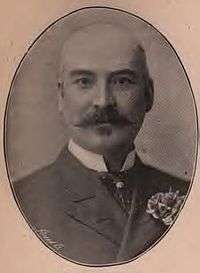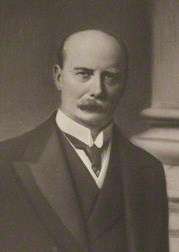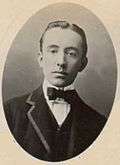Kingston-upon-Thames (UK Parliament constituency)
| Kingston-upon-Thames | |
|---|---|
|
Former Borough constituency for the House of Commons | |
| County |
1885–1965: Surrey 1965–1997: Greater London |
| Major settlements | Kingston upon Thames |
| 1918–1997 | |
| Number of members | One |
| Replaced by |
Kingston & Surbiton Richmond Park |
| 1885–1918 | |
| Number of members | One |
| Type of constituency | County constituency |
| Created from | East Surrey |
Kingston-upon-Thames was a parliamentary constituency in the South-West London suburb of Kingston upon Thames which returned one Member of Parliament (MP) to the House of Commons of the Parliament of the United Kingdom.
History
The constituency was created for the 1885 general election as a county division called Kingston from part of the East Surrey constituency. It became a borough constituency at the 1918 general election, when it was renamed as Kingston-upon-Thames.
It was abolished for the 1997 general election. Its territory was then divided between the new constituencies of Kingston and Surbiton and Richmond Park.
The constituency's most high-profile MP was the Conservative Norman Lamont, who was Chancellor of the Exchequer from 1990 to 1993.
Boundaries
1983-1997: The London Borough of Kingston upon Thames wards of Burlington, Cambridge, Canbury, Coombe, Grove, Hill, Malden, Manor, Norbiton, Norbiton Park, St James, and Tudor.
The constituency consisted of the town of Kingston upon Thames and the surrounding areas.
Members of Parliament
| Election | Member [1] | Party [2][3] | |
|---|---|---|---|
| 1885 | Sir John Ellis | Conservative | |
| 1892 | Sir Richard Temple | Conservative | |
| 1895 | Thomas Skewes-Cox | Conservative | |
| 1906 | George Cave | Conservative | |
| 1918 | John Campbell | Unionist | |
| 1922 | Sir Frederick Penny | Unionist | |
| 1937 b-e | Sir Percy Royds | Conservative | |
| 1945 | John Boyd-Carpenter | Conservative | |
| 1972 b-e | Norman Lamont | Conservative | |
| 1997 | constituency abolished | ||
Elections
Elections in the 1880s
| Party | Candidate | Votes | % | ± | |
|---|---|---|---|---|---|
| Conservative | Sir John Whittaker Ellis | 4,915 | n/a | ||
| Liberal | Charles Duncan Hodgson | 3,206 | n/a | ||
| Majority | 1,709 | n/a | |||
| Turnout | n/a | ||||
| Conservative win (new seat) | |||||
| Party | Candidate | Votes | % | ± | |
|---|---|---|---|---|---|
| Conservative | Sir John Whittaker Ellis | unopposed | n/a | n/a | |
| Conservative hold | Swing | n/a | |||
Elections in the 1890s

| Party | Candidate | Votes | % | ± | |
|---|---|---|---|---|---|
| Conservative | Sir Richard Temple | 5,100 | |||
| Liberal | Charles Duncan Hodgson | 4,357 | |||
| Majority | 743 | ||||
| Turnout | |||||
| Conservative hold | Swing | ||||

| Party | Candidate | Votes | % | ± | |
|---|---|---|---|---|---|
| Conservative | Thomas Skewes-Cox | 5,745 | |||
| Liberal | Charles Burt | 3,595 | |||
| Majority | 2,145 | ||||
| Turnout | |||||
| Conservative hold | Swing | ||||
Elections in the 1900s
| Party | Candidate | Votes | % | ± | |
|---|---|---|---|---|---|
| Conservative | Thomas Skewes-Cox | unopposed | n/a | n/a | |
| Conservative hold | Swing | n/a | |||

| Party | Candidate | Votes | % | ± | |
|---|---|---|---|---|---|
| Conservative | George Cave | 7,656 | |||
| Liberal | Robert Whyte | 6,637 | |||
| Majority | 1,019 | ||||
| Turnout | |||||
| Conservative hold | Swing | ||||
Elections in the 1910s

| Party | Candidate | Votes | % | ± | |
|---|---|---|---|---|---|
| Conservative | George Cave | 10,918 | |||
| Liberal | Albert George Holzapfel | 5,814 | |||
| Majority | |||||
| Turnout | |||||
| Conservative hold | Swing | ||||
| Party | Candidate | Votes | % | ± | |
|---|---|---|---|---|---|
| Conservative | George Cave | unopposed | n/a | n/a | |
| Conservative hold | Swing | n/a | |||
General Election 1914/15:
Another General Election was required to take place before the end of 1915. The political parties had been making preparations for an election to take place and by the July 1914, the following candidates had been selected;
- Unionist: George Cave
- Liberal:
| Party | Candidate | Votes | % | ± | |
|---|---|---|---|---|---|
| Unionist | 13,596 | 73.8 | |||
| Labour | Thomas Henry Dumper | 2,502 | 13.6 | ||
| Liberal | Arnold Ellis Ely | 2,325 | 12.6 | ||
| Majority | 11,094 | 60.2 | |||
| Turnout | 51.7 | ||||
| Unionist hold | Swing | ||||
- endorsed by the Coalition Government.
Elections in the 1920s
| Party | Candidate | Votes | % | ± | |
|---|---|---|---|---|---|
| Unionist | Frederick George Penny | 15,136 | 66.7 | ||
| Independent Labour | Harry Day | 7,563 | 33.3 | ||
| Majority | 7,573 | 33.4 | |||
| Turnout | 59.3 | ||||
| Unionist hold | Swing | ||||
| Party | Candidate | Votes | % | ± | |
|---|---|---|---|---|---|
| Unionist | Frederick George Penny | 12,968 | 61.6 | -5.1 | |
| Liberal | William Freeman | 8,095 | 38.4 | n/a | |
| Majority | 4,873 | 23.2 | -10.2 | ||
| Turnout | 53.9 | -5.4 | |||
| Unionist hold | Swing | ||||
| Party | Candidate | Votes | % | ± | |
|---|---|---|---|---|---|
| Unionist | Frederick George Penny | 19,933 | 70.2 | ||
| Labour | Arthur Balfour Bishop | 5,640 | 19.8 | ||
| Liberal | William Freeman | 2,850 | 10.0 | ||
| Majority | 14,293 | 50.4 | |||
| Turnout | 71.3 | ||||
| Unionist hold | Swing | ||||
| Party | Candidate | Votes | % | ± | |
|---|---|---|---|---|---|
| Unionist | Frederick George Penny | 20,911 | 54.1 | -16.1 | |
| Labour | John William Fawcett | 8,903 | 23.1 | +3.3 | |
| Liberal | Frank John Powell | 8,796 | 22.8 | +12.8 | |
| Majority | 12,008 | 31.0 | -19.4 | ||
| Turnout | 68.9 | -2.4 | |||
| Unionist hold | Swing | -9.7 | |||
Elections in the 1930s
| Party | Candidate | Votes | % | ± | |
|---|---|---|---|---|---|
| Conservative | Sir Frederick George Penny | 35,925 | 82.5 | ||
| Labour | John William Fawcett | 7,613 | 17.5 | ||
| Majority | 28,312 | 65.0 | |||
| Turnout | 69.2 | ||||
| Conservative hold | Swing | ||||
| Party | Candidate | Votes | % | ± | |
|---|---|---|---|---|---|
| Conservative | Sir Frederick George Penny | 32,953 | 67.5 | ||
| Labour | George Henry Loman | 10,014 | 20.5 | ||
| Liberal | Frank John Powell | 5,832 | 12.0 | ||
| Majority | 22,939 | 47.0 | |||
| Turnout | 65.5 | ||||
| Conservative hold | Swing | ||||
| Party | Candidate | Votes | % | ± | |
|---|---|---|---|---|---|
| Conservative | Percy Molyneux Rawson Royds | 19,887 | 66.6 | ||
| Labour | George Henry Loman | 9,972 | 33.4 | ||
| Majority | 9,915 | 33.2 | |||
| Turnout | 38.1 | ||||
| Conservative hold | Swing | ||||
General Election 1939/40
Another General Election was required to take place before the end of 1940. The political parties had been making preparations for an election to take place and by the Autumn of 1939, the following candidates had been selected;
- Conservative: Sir Percy Molyneux Rawson Royds
- Liberal: Henry Cecil Banting[17]
Elections in the 1940s
| Party | Candidate | Votes | % | ± | |
|---|---|---|---|---|---|
| Conservative | John Archibald Boyd-Carpenter | 37,085 | 56.5 | ||
| Labour | George Henry Elvin | 28,516 | 43.5 | ||
| Majority | 8,569 | 13.0 | |||
| Turnout | 74.0 | ||||
| Conservative hold | Swing | ||||
Elections in the 1950s
| Party | Candidate | Votes | % | ± | |
|---|---|---|---|---|---|
| Conservative | John Archibald Boyd-Carpenter | 36,886 | 58.98 | ||
| Labour | NM Johns | 21,229 | 33.94 | ||
| Liberal | Donald George Maskrey | 4,429 | 7.08 | ||
| Majority | 15,657 | 25.03 | |||
| Turnout | 85.24 | ||||
| Conservative hold | Swing | ||||
| Party | Candidate | Votes | % | ± | |
|---|---|---|---|---|---|
| Conservative | John Archibald Boyd-Carpenter | 38,516 | 63.52 | ||
| Labour | Ray Hesketh | 22,117 | 36.48 | ||
| Majority | 16,399 | 27.05 | |||
| Turnout | 81.14 | ||||
| Conservative hold | Swing | ||||
| Party | Candidate | Votes | % | ± | |
|---|---|---|---|---|---|
| Conservative | John Archibald Boyd-Carpenter | 31,069 | 65.86 | ||
| Labour | George Henry Loman | 16,104 | 34.14 | ||
| Majority | 14,965 | 31.72 | |||
| Turnout | 76.38 | ||||
| Conservative hold | Swing | ||||
| Party | Candidate | Votes | % | ± | |
|---|---|---|---|---|---|
| Conservative | John Archibald Boyd-Carpenter | 31,649 | 67.26 | ||
| Labour | Thomas Braddock | 15,408 | 32.74 | ||
| Majority | 16,241 | 34.51 | |||
| Turnout | 77.91 | ||||
| Conservative hold | Swing | ||||
Elections in the 1960s
| Party | Candidate | Votes | % | ± | |
|---|---|---|---|---|---|
| Conservative | John Archibald Boyd-Carpenter | 23,973 | 52.79 | ||
| Labour | Thomas Braddock | 13,611 | 29.97 | ||
| Liberal | Anthony Stanley Richard Rundle | 7,827 | 17.24 | ||
| Majority | 10,362 | 22.82 | |||
| Turnout | 77.12 | ||||
| Conservative hold | Swing | ||||
| Party | Candidate | Votes | % | ± | |
|---|---|---|---|---|---|
| Conservative | John Archibald Boyd-Carpenter | 22,781 | 51.29 | ||
| Labour | James Stewart Cook | 14,915 | 33.58 | ||
| Liberal | Michael F Burns | 6,722 | 15.13 | ||
| Majority | 7,866 | 17.71 | |||
| Turnout | 76.97 | ||||
| Conservative hold | Swing | ||||
Elections in the 1970s
| Party | Candidate | Votes | % | ± | |
|---|---|---|---|---|---|
| Conservative | John Archibald Boyd-Carpenter | 23,426 | 56.67 | ||
| Labour | Robin H Crockett | 13,090 | 31.67 | ||
| Liberal | Stephen J. Wells | 4,822 | 11.66 | ||
| Majority | 10,336 | 25.0 | |||
| Turnout | 41,338 | 69.13 | |||
| Conservative hold | Swing | ||||
| Party | Candidate | Votes | % | ± | |
|---|---|---|---|---|---|
| Conservative | Norman Stewart Hughson Lamont | 16,679 | 52.32 | -4.25 | |
| Labour | Anthony Judge | 9,892 | 31.03 | -0.64 | |
| Liberal | Stephen J. Wells | 3,601 | 11.3 | -0.36 | |
| Anti-Common Market Conservative | Edgar Scruby | 1,705 | 5.35 | N/A | |
| Majority | 6,787 | 21.29 | |||
| Turnout | 31,877 | ||||
| Conservative hold | Swing | ||||
| Party | Candidate | Votes | % | ± | |
|---|---|---|---|---|---|
| Conservative | Norman Stewart Hughson Lamont | 23,006 | 48.57 | ||
| Liberal | Stephen J. Wells | 12,699 | 28.81 | ||
| Labour | Christopher John Mullin | 11,369 | 24.00 | ||
| Anti-Common Market Conservative | M.J. Christie | 288 | 0.61 | ||
| Majority | 10,307 | 21.76 | |||
| Turnout | 80.53 | ||||
| Conservative hold | Swing | ||||
| Party | Candidate | Votes | % | ± | |
|---|---|---|---|---|---|
| Conservative | Norman Stewart Hughson Lamont | 20,680 | 48.63 | ||
| Labour | A. Quick | 12,266 | 28.84 | ||
| Liberal | Stephen J. Wells | 9,580 | 22.53 | ||
| Majority | 8,414 | 19.79 | |||
| Turnout | 71.77 | ||||
| Conservative hold | Swing | ||||
| Party | Candidate | Votes | % | ± | |
|---|---|---|---|---|---|
| Conservative | Norman Stewart Hughson Lamont | 24,944 | 57.85 | ||
| Labour | John A. Torode | 11,400 | 26.44 | ||
| Liberal | Declan Terry | 6,771 | 15.70 | ||
| Majority | 13,544 | 31.41 | |||
| Turnout | 74.89 | ||||
| Conservative hold | Swing | ||||
Elections in the 1980s
| Party | Candidate | Votes | % | ± | |
|---|---|---|---|---|---|
| Conservative | Norman Stewart Hughson Lamont | 22,094 | 54.10 | ||
| Liberal | Roger Mark Hayes | 13,222 | 32.37 | ||
| Labour | Peter J. Smith | 4,977 | 12.19 | ||
| Ecology | Alexandra Presant-Collins | 290 | 0.71 | ||
| Loony Society | Peter Dodd | 259 | 0.63 | ||
| Majority | 8,872 | 21.72 | |||
| Turnout | 71.91 | ||||
| Conservative hold | Swing | ||||
| Party | Candidate | Votes | % | ± | |
|---|---|---|---|---|---|
| Conservative | Norman Stewart Hughson Lamont | 24,198 | 56.19 | ||
| Liberal | Roger Mark Hayes | 13,012 | 30.22 | ||
| Labour | Robert Harold Markless | 5,676 | 13.18 | ||
| CPWSML | Jack Baker | 175 | 0.41 | ||
| Majority | 11,186 | 25.98 | |||
| Turnout | 78.52 | ||||
| Conservative hold | Swing | ||||
Elections in the 1990s
| Party | Candidate | Votes | % | ± | |
|---|---|---|---|---|---|
| Conservative | Norman Stewart Hughson Lamont | 20,675 | 51.6 | −4.6 | |
| Liberal Democrat | Derek Richard Osbourne | 10,522 | 26.3 | −3.9 | |
| Labour | Robert Harold Markless | 7,748 | 19.3 | +6.2 | |
| Liberal | Adrian Charles Amer | 771 | 1.9 | +1.9 | |
| Monster Raving Loony | David John Beaupré | 212 | 0.5 | +0.5 | |
| Natural Law | Graham Douglas Woollcoombe | 81 | 0.2 | +0.2 | |
| Anti-Federalist League | Anthony John Edward Scholefield | 42 | 0.1 | +0.1 | |
| Majority | 10,153 | 25.4 | −0.6 | ||
| Turnout | 40,051 | 78.4 | −0.1 | ||
| Conservative hold | Swing | −0.3 | |||
References
- ↑ Leigh Rayment's Historical List of MPs – Constituencies beginning with "K" (part 2)
- ↑ Craig, F. W. S. (1989) [1977]. British parliamentary election results 1832–1885 (2nd ed.). Chichester: Parliamentary Research Services. p. 366. ISBN 0-900178-26-4.
- ↑ Craig, F. W. S. (1983) [1969]. British parliamentary election results 1918–1949 (3rd ed.). Chichester: Parliamentary Research Services. p. 399. ISBN 0-900178-06-X.
- ↑ The Liberal Year Book, 1907
- ↑ The Liberal Year Book, 1907
- ↑ The Liberal Year Book, 1907
- ↑ Debrett's House of Commons & Judicial Bench, 1901
- ↑ Debrett's House of Commons & Judicial Bench, 1901
- ↑ The Liberal Year Book, 1907
- ↑ Debrett's House of Commons & Judicial Bench, 1916
- ↑ Debrett's House of Commons & Judicial Bench, 1916
- ↑ British Parliamentary Election Results 1918-1949, FWS Craig
- ↑ British Parliamentary Election Results 1918-1949, FWS Craig
- ↑ British Parliamentary Election Results 1918-1949, FWS Craig
- ↑ British Parliamentary Election Results 1918-1949, FWS Craig
- 1 2 3 British parliamentary election results 1885-1918, Craig, F. W. S.
- ↑ The Liberal Magazine, 1939
- ↑ "Politics Resources". Election 1992. Politics Resources. 9 April 1992. Retrieved 6 Dec 2010.
| Parliament of the United Kingdom | ||
|---|---|---|
| Preceded by Huntingdon |
Constituency represented by the Chancellor of the Exchequer 1990 – 1993 |
Succeeded by Rushcliffe |